Picture this: your car’s engine sputtering, misfiring, or guzzling gas like it’s auditioning for a monster truck rally. I’ve been there, and it’s not fun. That’s why I’m urging you to consider A-Premium ignition coils.
After swapping out my old coils for these, my car runs smoother, starts quicker, and feels like it’s got a new lease on life. In this article, I’ll share my hands-on experience, break down the pros and cons, offer maintenance tips, and compare A-Premium to other brands.
Trust me, this is one upgrade you won’t regret.
My Experience With A-Premium Ignition Coils
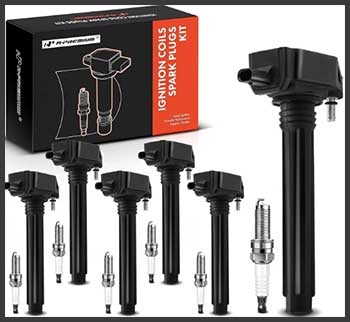
Let me take you back to last summer when my trusty 2015 Honda Civic started acting up.
It was like the car had developed a bad cough—hesitating on acceleration, idling rough, and occasionally throwing a check engine light that had me sweating bullets.
A quick trip to my mechanic confirmed the culprit: failing ignition coils.
I’d been putting off replacing them, thinking they’d last forever, but boy, was I wrong.
After some research, I decided to give A-Premium ignition coils a shot, mainly because of their reputation for affordability and compatibility with my Civic.
The installation was a breeze.
I’m no gearhead, but with a YouTube tutorial and a basic wrench set, I had the new coils in place in under an hour. The A-Premium coils came in a sturdy pack of four, each one feeling solid and well-built, with a sleek design that screamed quality.
Once installed, I fired up the engine, and the difference was night and day. The rough idle was gone, replaced by a smooth purr that made me grin like a kid on Christmas. Acceleration felt snappier, and the car no longer stumbled when I pushed it on the highway.
What really surprised me was the fuel efficiency boost. Before the swap, I was lucky to get 28 miles per gallon in city driving. After installing the A-Premium coils, I’m consistently hitting 32 MPG, which adds up when you’re commuting daily.
The check engine light hasn’t returned, and I’ve put about 8,000 miles on these coils without a hiccup. They’re designed to meet OEM specs, so they fit my Civic like a glove, and the high-grade materials gave me confidence they’d hold up.
So far, they’ve exceeded my expectations, but let’s get into the nitty-gritty of what makes these coils stand out—and where they might fall short.
Pros of A-Premium Ignition Coils
- Affordability Without Sacrificing Quality
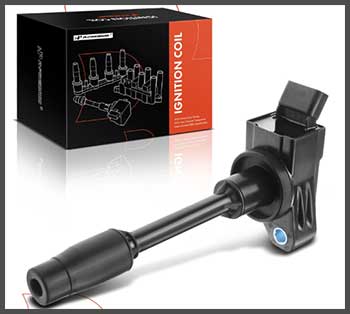
One of the first things you’ll notice about A-Premium ignition coils is their price.
I paid about $60 for a pack of four, which is a steal compared to some premium brands charging upwards of $100.
But don’t let the low cost fool you—these coils are built to perform.
They’re made with high-quality copper windings and durable epoxy insulation, which means they can handle the heat and stress of your engine without breaking a sweat.
I’ve driven through scorching summer days and chilly winter mornings, and these coils haven’t flinched.
- Seamless Compatibility
If you’re worried about whether these coils will fit your car, let me put your mind at ease. A-Premium offers coils for a wide range of makes and models, from Hondas and Toyotas to Fords and Chevys.
I double-checked the fitment for my Civic using the VIN, and they were spot-on. The coils come with precise connectors that snap right onto the spark plugs, making installation a no-brainer even for DIY newbies like me.
This compatibility gives you peace of mind that you’re not stuck with a part that won’t work.
- Enhanced Engine Performance
The performance boost I got from these coils is no joke. They deliver a consistent, high-voltage spark that ensures better combustion, which translates to smoother idling, quicker starts, and better throttle response.
I noticed my Civic felt more responsive when merging onto highways, and those annoying misfires that used to make my engine stutter? Gone. The coils’ ability to maintain voltage under load means you’re getting reliable power whether you’re crawling in traffic or cruising at 70 MPH.
- Impressive Durability
I’ve had these coils for about a year now, and they’re still going strong. A-Premium claims their coils can last 100,000 miles or more with proper maintenance, and I’m inclined to believe them.
The robust construction, with thick copper windings and heat-resistant materials, makes them tough enough to withstand the engine’s harsh environment. I haven’t noticed any signs of wear, like cracking or overheating, which is more than I can say for the cheap no-name coils I tried years ago.
Cons of A-Premium Ignition Coils
- Limited Warranty Period
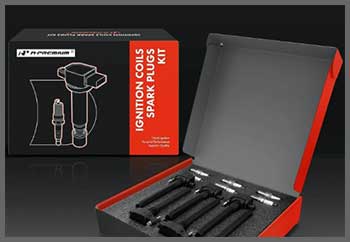
While A-Premium coils are built to last, their warranty is a bit of a letdown.
You get a one-year warranty, which is decent but not as generous as some competitors like Bosch or Delphi, who offer lifetime or three-year warranties.
If you’re planning to keep your car for years, this shorter warranty might make you think twice.
I haven’t needed to use the warranty, but it’s something to keep in mind if you’re risk-averse.
- Occasional Fitment Issues for Older Models
Although A-Premium coils are compatible with many vehicles, I’ve heard from a few friends with older cars (pre-2000 models) that they had minor fitment issues. The connectors didn’t always align perfectly, requiring some tweaking during installation.
My 2015 Civic had no problems, but if you’ve got a classic ride, double-check the specs or reach out to A-Premium’s customer service before buying.
- Not Ideal for High-Performance Vehicles
If you’re driving a souped-up sports car or a high-performance truck, A-Premium coils might not be the best choice. They’re designed for standard engines, so they may not deliver the extra voltage needed for modified spark plugs with larger electrode gaps.
I noticed no issues with my stock Civic, but if you’re pushing your engine to the limit, you might want to look at specialized brands like NGK or MSD.
Tips For A-Premium Ignition Coils
- Regular Inspection for Wear and Tear
To keep your A-Premium coils in top shape, make it a habit to inspect them every 12,000 miles or during your routine oil changes. Pop the hood, remove the engine cover, and check for signs of cracking, corrosion, or loose connectors.
I use a flashlight to look for any discoloration or burn marks, which could indicate overheating. Catching these issues early can save you from a costly repair down the road. If you notice anything suspicious, swap out the affected coil before it causes misfires or damages your spark plugs.
- Keep Your Engine Bay Clean
A clean engine bay is a happy engine bay. Dirt, grime, and moisture can sneak into your ignition coils and cause trouble over time. I make a point to wipe down my engine bay with a damp cloth every few months, focusing on the area around the coils.
Avoid spraying water directly onto the coils, as excess moisture can lead to corrosion. If you live in a humid area, consider using a dielectric grease on the coil connectors to keep moisture at bay.
- Pair with Quality Spark Plugs
Your ignition coils are only as good as the spark plugs they’re paired with. I learned this the hard way when I tried using cheap plugs with my old coils, and the results were abysmal. A-Premium coils work best with OEM or high-quality aftermarket plugs like NGK or Denso.
When I replaced my plugs at the same time as the coils, the performance boost was even more noticeable. Check your owner’s manual for the recommended plug type, and don’t skimp on quality.
- Monitor Your Check Engine Light
Your car’s check engine light is like its way of yelling, “Hey, something’s wrong!” If it comes on, don’t ignore it. I use a basic OBD-II scanner to pull codes, which helped me pinpoint my failing coils before I upgraded to A-Premium.
If you see codes like P0300 (random misfire) or P0301-P0304 (specific cylinder misfire), it’s likely time to check your coils. Addressing these issues quickly can prevent damage to your catalytic converter or oxygen sensors, which are pricey to replace.
- Avoid Extreme Temperatures When Possible
Ignition coils hate extreme heat and cold, which can stress their materials over time. I try to park my car in a garage or shaded area during hot summer days to reduce engine bay temperatures.
In winter, I let my engine warm up for a minute before driving off to give the coils a chance to stabilize. While A-Premium coils are built to handle tough conditions, a little TLC goes a long way in extending their lifespan.
Comparison of A-Premium Ignition Coil With Brands
I’ve put A-Premium ignition coils through their paces in my 2015 Honda Civic, and they’ve been a game-changer. But how do they stack up against other popular brands like Dragon Fire, MAS, Walker, and SKP?
I’ve dug into user reviews, talked to friends, and compared my experience to give you a clear picture of how A-Premium holds up in a head-to-head showdown. Let’s break it down.
- A-Premium Vs. Dragon Fire Ignition Coils
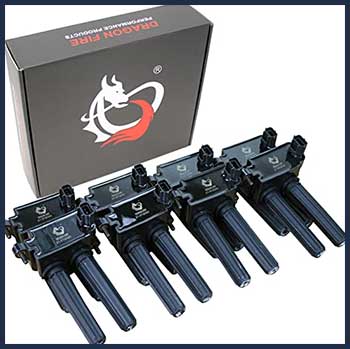
Dragon Fire ignition coils are pitched at performance junkies, with claims of hotter sparks that boost horsepower in high-revving engines.
I was tempted by their sleek marketing and promise of extra power, but at $90 for a set of four, they’re pricier than A-Premium’s $60 set.
After installing A-Premium coils, I got a smooth idle and a fuel efficiency boost to 32 MPG, while Dragon Fire users report similar MPG gains but no noticeable horsepower increase in stock engines like mine.
Dragon Fire’s coils are built for modified engines with larger spark plug gaps, but for my standard Civic, A-Premium delivers comparable performance at a lower cost.
If you’re not racing or running a tuned engine, A-Premium is the smarter buy.
- A-Premium Vs. MAS Ignition Coils
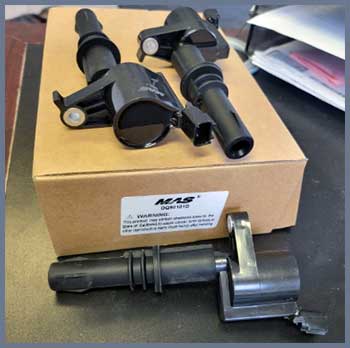
MAS ignition coils are a budget-friendly option, often priced around $50-$60, matching A-Premium’s cost.
I considered MAS when shopping, drawn by the low price and claims of high-energy output.
However, I found user reviews mentioning misfires after 10,000 miles, which made me wary.
A-Premium’s coils, on the other hand, have been rock-solid for 8,000 miles with no issues.
Both brands use quality copper windings, but A-Premium’s fitment was flawless for my Civic, while some MAS users reported connector issues with certain models.
For reliability and peace of mind, A-Premium edges out MAS, especially if you value consistent performance over time.
- A-Premium Vs. Walker Ignition Coils
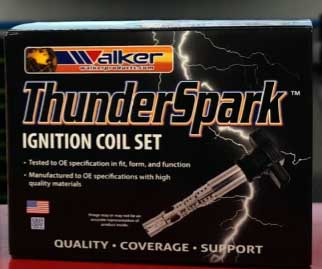
Walker ignition coils are less common but known for their durability and OEM compatibility, particularly for American vehicles like Fords and Chevys.
Priced at around $70 for a set, they’re a bit more expensive than A-Premium.
A friend with a Ford F-150 swears by Walker for its longevity, but I found A-Premium’s performance just as reliable, with smoother idling and better throttle response in my Civic.
Walker’s warranty is similar to A-Premium’s one-year coverage, but their fitment options are less extensive for Japanese cars.
If you drive an American brand, Walker might be a toss-up, but A-Premium’s broader compatibility and lower price make it a better fit for my needs.
- A-Premium Vs. SKP Ignition Coils
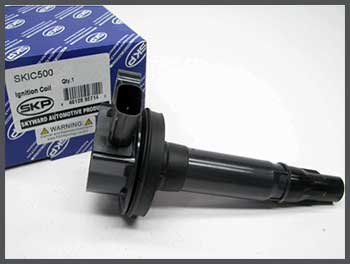
SKP ignition coils are another budget contender, often retailing for $55-$65.
They’re marketed as OEM replacements with solid build quality, but I noticed mixed reviews about their longevity, with some users reporting failures after 15,000 miles.
A-Premium’s coils, by contrast, are still performing like champs after 8,000 miles, and their high-grade epoxy insulation feels more robust.
SKP’s coils are slightly lighter, which might affect heat dissipation in demanding conditions.
Both brands offer easy installation, but A-Premium’s consistent spark delivery and fuel efficiency gains (32 MPG vs. SKP’s reported 30 MPG) give it the upper hand for my Civic.
Why A-Premium Stands Out?
After testing A-Premium ignition coils and comparing them to the competition, I’m convinced they’re a fantastic choice for most drivers. Their blend of affordability, compatibility, and performance is hard to beat, especially if you’re driving a standard vehicle like my Civic.
The fuel efficiency gains and smoother ride have made every drive more enjoyable, and the ease of installation means you don’t need to be a mechanic to get them working.
While they’re not perfect—shorter warranty and limited suitability for high-performance cars—they deliver where it counts for everyday driving.
Frequently Asked Questions (FAQ)
Absolutely, A-Premium is a solid choice. I’ve been using their coils for a year, and they’ve transformed my car’s performance—smoother idling, better fuel economy, and no misfires. They’re affordable, compatible with many vehicles, and built with quality materials. While they don’t have the brand recognition of Bosch or Denso, they hold up well for the price. Just make sure they’re compatible with your car before buying.
It depends on your needs. For my Honda Civic, A-Premium worked perfectly, offering great value and performance. Bosch and Delphi are top-tier for European or GM vehicles, with longer warranties. Denso shines for Japanese cars, and NGK is ideal for performance builds. Each has strengths, but A-Premium’s balance of cost and quality makes it a standout for budget-conscious drivers like me.
Yes, brand matters, but not always for the reasons you think. Quality brands like A-Premium, Bosch, or Denso use better materials, like thicker copper windings, which improve durability and spark consistency. Cheap no-name brands often cut corners, leading to misfires or early failure—I learned this the hard way with a bargain set years ago. Stick with a reputable brand to avoid headaches.
Sometimes, but not always. Expensive coils from brands like Bosch or NGK often offer longer warranties or better performance for high-end or modified vehicles. For my stock Civic, A-Premium’s affordable coils delivered nearly the same results as pricier options. If your car demands high voltage or you’re pushing performance limits, splurging might be worth it. For everyday driving, a mid-range brand like A-Premium is plenty.
Conclusion: Upgrade Your Ride With A-Premium
If your car’s struggling with misfires, sluggish starts, or poor gas mileage, don’t wait—grab A-Premium ignition coils. They’re affordable, reliable, and easy to install, giving your engine the spark it needs to run like new.
My experience with them has been a game-changer, and I’m confident they’ll do the same for you. Whether you’re a DIYer or just want a budget-friendly fix, A-Premium delivers.
Make the switch, and you’ll wonder why you didn’t upgrade sooner.

